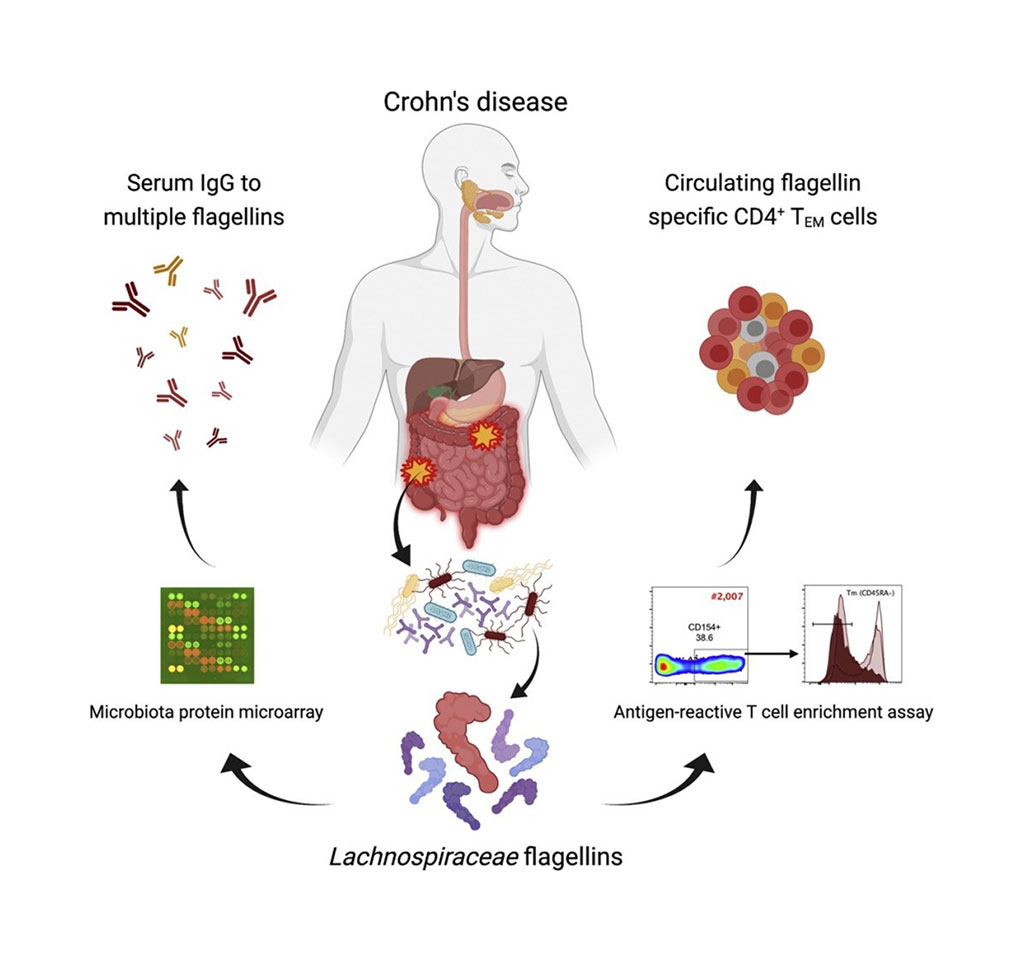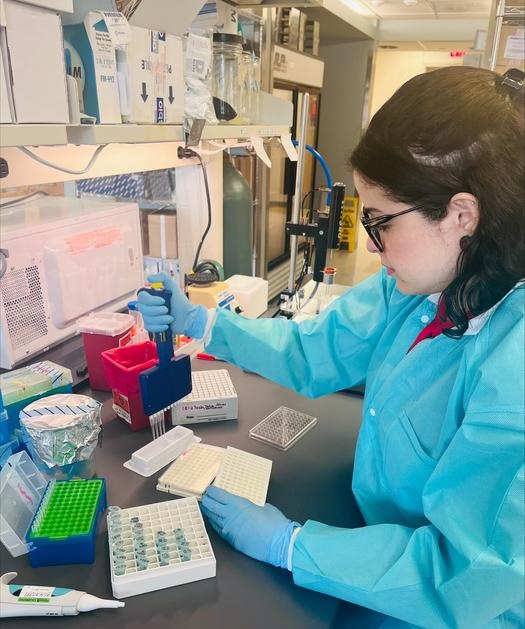Human Microbiota Flagellins Drive Adaptive Immune Responses in Crohn’s Disease
|
By LabMedica International staff writers Posted on 20 May 2021 |

Image: Schematic diagram of How Human Microbiota Flagellins Drive Adaptive Immune Responses in Crohn’s Disease (Photo courtesy of University of Alabama at Birmingham)
Crohn's disease and ulcerative colitis, another type of inflammatory bowel disease (IBD), are characterized by dysregulated adaptive immune responses to the microbiota in genetically susceptible individuals, but the human specificity of these responses had so far been largely undefined.
Flagellins are building blocks of the hair-like motility flagella that extend from the bacterial cell wall. Flagellin is a potent immune activator and antigen, and it is the only known microbial protein that has three receptors for innate immunity encoded in the host genome, in addition to immunoglobulin and T cell receptors.
Medical Scientists at the University of Alabama at Birmingham (Birmingham, AL, USA) individually probed blood sera from 87 healthy volunteers, 152 patients with Crohn's disease and 170 patients with ulcerative colitis. They used protein arrays of microbiota bacterial flagellins of both mouse and human origin, and they analyzed sera for IgG and IgA antibody responses. Circulating flagellin-reactive T effector (CD4+CD154+) and T regulatory (CD4+CD137+) cells were isolated and evaluated in selected patients. Resulting adaptive immune responses were compared with corresponding clinical data to determine relevancy to disease behavior.
The investigators reported that patients with IBD express selective patterns of antibody reactivity to microbiota flagellins. Patients with Crohn’s disease, but not patients with ulcerative colitis, display augmented serum IgG to human ileal-localized Lachnospiraceae flagellins, with a subset of patients having high responses to more than 10 flagellins. Elevated responses to CBir1, a mouse Lachnospiraceae flagellin used clinically to diagnose CD, correlated with multi-Lachnospiraceae flagellin reactivity. In this subset of patients with CD, multi-flagellin reactivity was associated with elevated flagellin-specific CD154+CD45RA– T memory cells, a reduced ratio of flagellin-reactive CD4+ T regulatory to T effector cells, and a high frequency of disease complications.
Charles O. Elson, MD, a Professor of Medicine and Microbiology and senior author of the study, said, “Crohn's disease patients displayed a strong adaptive immune response to human-derived Lachnospiraceae flagellins, which may be targeted for prognosis and future personalized therapies.” The study was originally published on April 9, 2021 in the journal Gastroenterology.
Related Links:
University of Alabama at Birmingham
Flagellins are building blocks of the hair-like motility flagella that extend from the bacterial cell wall. Flagellin is a potent immune activator and antigen, and it is the only known microbial protein that has three receptors for innate immunity encoded in the host genome, in addition to immunoglobulin and T cell receptors.
Medical Scientists at the University of Alabama at Birmingham (Birmingham, AL, USA) individually probed blood sera from 87 healthy volunteers, 152 patients with Crohn's disease and 170 patients with ulcerative colitis. They used protein arrays of microbiota bacterial flagellins of both mouse and human origin, and they analyzed sera for IgG and IgA antibody responses. Circulating flagellin-reactive T effector (CD4+CD154+) and T regulatory (CD4+CD137+) cells were isolated and evaluated in selected patients. Resulting adaptive immune responses were compared with corresponding clinical data to determine relevancy to disease behavior.
The investigators reported that patients with IBD express selective patterns of antibody reactivity to microbiota flagellins. Patients with Crohn’s disease, but not patients with ulcerative colitis, display augmented serum IgG to human ileal-localized Lachnospiraceae flagellins, with a subset of patients having high responses to more than 10 flagellins. Elevated responses to CBir1, a mouse Lachnospiraceae flagellin used clinically to diagnose CD, correlated with multi-Lachnospiraceae flagellin reactivity. In this subset of patients with CD, multi-flagellin reactivity was associated with elevated flagellin-specific CD154+CD45RA– T memory cells, a reduced ratio of flagellin-reactive CD4+ T regulatory to T effector cells, and a high frequency of disease complications.
Charles O. Elson, MD, a Professor of Medicine and Microbiology and senior author of the study, said, “Crohn's disease patients displayed a strong adaptive immune response to human-derived Lachnospiraceae flagellins, which may be targeted for prognosis and future personalized therapies.” The study was originally published on April 9, 2021 in the journal Gastroenterology.
Related Links:
University of Alabama at Birmingham
Latest Pathology News
- Hyperspectral Dark-Field Microscopy Enables Rapid and Accurate Identification of Cancerous Tissues
- AI Advancements Enable Leap into 3D Pathology
- New Blood Test Device Modeled on Leeches to Help Diagnose Malaria
- Robotic Blood Drawing Device to Revolutionize Sample Collection for Diagnostic Testing
- Use of DICOM Images for Pathology Diagnostics Marks Significant Step towards Standardization
- First of Its Kind Universal Tool to Revolutionize Sample Collection for Diagnostic Tests
- AI-Powered Digital Imaging System to Revolutionize Cancer Diagnosis
- New Mycobacterium Tuberculosis Panel to Support Real-Time Surveillance and Combat Antimicrobial Resistance
- New Method Offers Sustainable Approach to Universal Metabolic Cancer Diagnosis
- Spatial Tissue Analysis Identifies Patterns Associated With Ovarian Cancer Relapse
- Unique Hand-Warming Technology Supports High-Quality Fingertip Blood Sample Collection
- Image-Based AI Shows Promise for Parasite Detection in Digitized Stool Samples
- Deep Learning Powered AI Algorithms Improve Skin Cancer Diagnostic Accuracy
- Microfluidic Device for Cancer Detection Precisely Separates Tumor Entities
- Virtual Skin Biopsy Determines Presence of Cancerous Cells
- AI Detects Viable Tumor Cells for Accurate Bone Cancer Prognoses Post Chemotherapy
Channels
Clinical Chemistry
view channel
3D Printed Point-Of-Care Mass Spectrometer Outperforms State-Of-The-Art Models
Mass spectrometry is a precise technique for identifying the chemical components of a sample and has significant potential for monitoring chronic illness health states, such as measuring hormone levels... Read more.jpg)
POC Biomedical Test Spins Water Droplet Using Sound Waves for Cancer Detection
Exosomes, tiny cellular bioparticles carrying a specific set of proteins, lipids, and genetic materials, play a crucial role in cell communication and hold promise for non-invasive diagnostics.... Read more
Highly Reliable Cell-Based Assay Enables Accurate Diagnosis of Endocrine Diseases
The conventional methods for measuring free cortisol, the body's stress hormone, from blood or saliva are quite demanding and require sample processing. The most common method, therefore, involves collecting... Read moreMolecular Diagnostics
view channelUltrasound-Aided Blood Testing Detects Cancer Biomarkers from Cells
Ultrasound imaging serves as a noninvasive method to locate and monitor cancerous tumors effectively. However, crucial details about the cancer, such as the specific types of cells and genetic mutations... Read more_1.jpg)
New DNA Origami Technique to Advance Disease Diagnosis
DNA origami is a method used to create nanostructures with exceptional precision, utilizing DNA strands as the foundational building blocks. These structures, however, are inherently fragile and prone... Read more.jpg)
New Respiratory Syndromic Testing Panel Provides Fast and Accurate Results
Respiratory tract infections are a major reason for emergency department visits and hospitalizations. According to the CDC, the U.S. sees up to 41 million influenza cases annually, resulting in several... Read more
New Synthetic Biomarker Technology Differentiates Between Prior Zika and Dengue Infections
Until now, researchers and clinicians have lacked diagnostic tools to easily differentiate between past infections with different flaviviruses—a family of mostly mosquito- and tick-borne viruses that include... Read moreHematology
view channel
Next Generation Instrument Screens for Hemoglobin Disorders in Newborns
Hemoglobinopathies, the most widespread inherited conditions globally, affect about 7% of the population as carriers, with 2.7% of newborns being born with these conditions. The spectrum of clinical manifestations... Read more
First 4-in-1 Nucleic Acid Test for Arbovirus Screening to Reduce Risk of Transfusion-Transmitted Infections
Arboviruses represent an emerging global health threat, exacerbated by climate change and increased international travel that is facilitating their spread across new regions. Chikungunya, dengue, West... Read more
POC Finger-Prick Blood Test Determines Risk of Neutropenic Sepsis in Patients Undergoing Chemotherapy
Neutropenia, a decrease in neutrophils (a type of white blood cell crucial for fighting infections), is a frequent side effect of certain cancer treatments. This condition elevates the risk of infections,... Read more
First Affordable and Rapid Test for Beta Thalassemia Demonstrates 99% Diagnostic Accuracy
Hemoglobin disorders rank as some of the most prevalent monogenic diseases globally. Among various hemoglobin disorders, beta thalassemia, a hereditary blood disorder, affects about 1.5% of the world's... Read moreMicrobiology
view channel
Integrated Solution Ushers New Era of Automated Tuberculosis Testing
Tuberculosis (TB) is responsible for 1.3 million deaths every year, positioning it as one of the top killers globally due to a single infectious agent. In 2022, around 10.6 million people were diagnosed... Read more
Automated Sepsis Test System Enables Rapid Diagnosis for Patients with Severe Bloodstream Infections
Sepsis affects up to 50 million people globally each year, with bacteraemia, formerly known as blood poisoning, being a major cause. In the United States alone, approximately two million individuals are... Read moreEnhanced Rapid Syndromic Molecular Diagnostic Solution Detects Broad Range of Infectious Diseases
GenMark Diagnostics (Carlsbad, CA, USA), a member of the Roche Group (Basel, Switzerland), has rebranded its ePlex® system as the cobas eplex system. This rebranding under the globally renowned cobas name... Read more
Clinical Decision Support Software a Game-Changer in Antimicrobial Resistance Battle
Antimicrobial resistance (AMR) is a serious global public health concern that claims millions of lives every year. It primarily results from the inappropriate and excessive use of antibiotics, which reduces... Read morePathology
view channelHyperspectral Dark-Field Microscopy Enables Rapid and Accurate Identification of Cancerous Tissues
Breast cancer remains a major cause of cancer-related mortality among women. Breast-conserving surgery (BCS), also known as lumpectomy, is the removal of the cancerous lump and a small margin of surrounding tissue.... Read more
AI Advancements Enable Leap into 3D Pathology
Human tissue is complex, intricate, and naturally three-dimensional. However, the thin two-dimensional tissue slices commonly used by pathologists to diagnose diseases provide only a limited view of the... Read more
New Blood Test Device Modeled on Leeches to Help Diagnose Malaria
Many individuals have a fear of needles, making the experience of having blood drawn from their arm particularly distressing. An alternative method involves taking blood from the fingertip or earlobe,... Read more
Robotic Blood Drawing Device to Revolutionize Sample Collection for Diagnostic Testing
Blood drawing is performed billions of times each year worldwide, playing a critical role in diagnostic procedures. Despite its importance, clinical laboratories are dealing with significant staff shortages,... Read moreTechnology
view channel
New Diagnostic System Achieves PCR Testing Accuracy
While PCR tests are the gold standard of accuracy for virology testing, they come with limitations such as complexity, the need for skilled lab operators, and longer result times. They also require complex... Read more
DNA Biosensor Enables Early Diagnosis of Cervical Cancer
Molybdenum disulfide (MoS2), recognized for its potential to form two-dimensional nanosheets like graphene, is a material that's increasingly catching the eye of the scientific community.... Read more
Self-Heating Microfluidic Devices Can Detect Diseases in Tiny Blood or Fluid Samples
Microfluidics, which are miniature devices that control the flow of liquids and facilitate chemical reactions, play a key role in disease detection from small samples of blood or other fluids.... Read more
Breakthrough in Diagnostic Technology Could Make On-The-Spot Testing Widely Accessible
Home testing gained significant importance during the COVID-19 pandemic, yet the availability of rapid tests is limited, and most of them can only drive one liquid across the strip, leading to continued... Read moreIndustry
view channel
Danaher and Johns Hopkins University Collaborate to Improve Neurological Diagnosis
Unlike severe traumatic brain injury (TBI), mild TBI often does not show clear correlations with abnormalities detected through head computed tomography (CT) scans. Consequently, there is a pressing need... Read more
Beckman Coulter and MeMed Expand Host Immune Response Diagnostics Partnership
Beckman Coulter Diagnostics (Brea, CA, USA) and MeMed BV (Haifa, Israel) have expanded their host immune response diagnostics partnership. Beckman Coulter is now an authorized distributor of the MeMed... Read more_1.jpg)









 Reagent.jpg)


